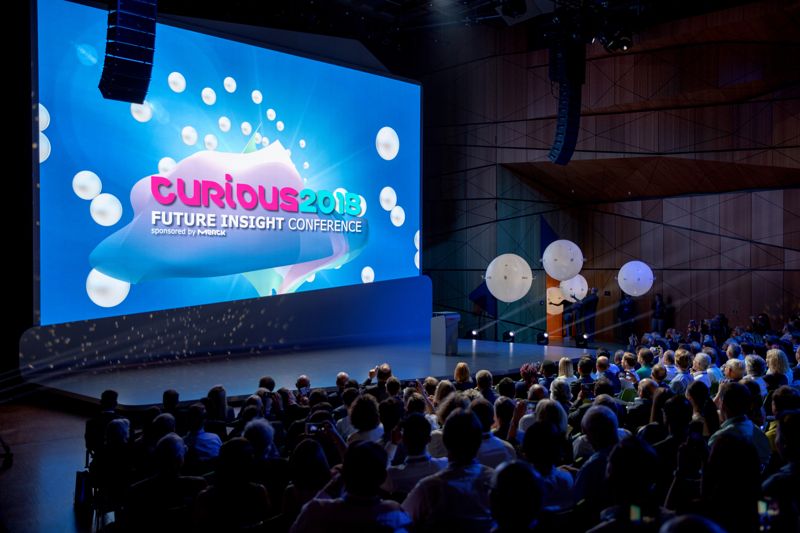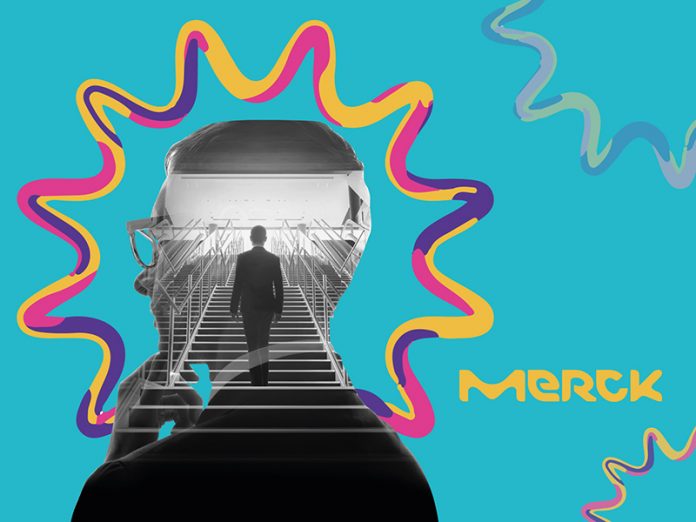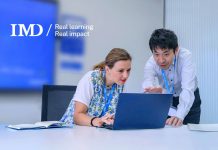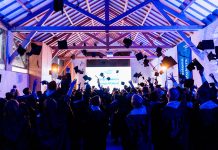Merck, a vibrant science and technology company, celebrated its 350th anniversary in 2018. Dr. Ulrich A.K. Betz, VP and Head of Innovation and Entrepreneurship Incubator, highlights the vision the company has for the future as well as the series of science & technology programmes and activities that were set up in order to install a global movement, underlining the importance of science & technology to build a better world.
Over the millennia humanity has made incredible progress in advancing science and technology, just compare one of our first tools, the stone age wedge, with the complexity of a modern computer chip. With the help of science & technology our population has grown to the amazing number of 7 billion people creating an unprecedented imprint on our planet resulting in a new global era: the Anthropocene. But there is a series of unsolved global problems: nutrition for a growing world population, global pollution bringing the ecosystems to the brink of collapse, global warming, increasing pandemic threats just to mention a few. In addition, despite all progress we see, the dirty little truth is that it has been much slower than predicted. By the year 2000 we already had planned to have cities on the moon, colonies on Mars, all diseases eradicated, weather under full control etc. just to mention a few. In fact, apart from the smartphones in our hands, if you look out of the window the world looks quite similar as it looked in the 70s. So further progress in science & technology is required to solve the problems of today and tomorrow.1
Merck, a vibrant science and technology company, celebrated its 350th anniversary in 2018. At the occasion of this anniversary we wanted to look forward into the future, elucidating key technological trends, future game-changers and identify partners from all over the world to make great things happen and to jointly advance science & technology further, to work with the best minds in science and entrepreneurship to realise the dreams of a better tomorrow.2,3
For that purpose, a comprehensive science & technology program was set-up consisting of three consecutive phases. Phase I, the “conceive” phase, defined the challenges and dreams of today and tomorrow and involved a series of surveys and forecasts as well as joint editions with top scientific journals. In phase II, the “convene” phase, a series of events was conducted bringing key players together to share their work and discuss new ideas. Finally, phase III, the “realise” phase made resources available to realise and advance joint projects.
A series of surveys and interviews on what the future of science & technology will hold were conducted with top experts and with readers from Nature, Science and Harvard Business Review. An analysis around “Breakthrough Innovation in the 21st Century” was published4 as well as a comprehensive Nature Outlook on “The Future of Medicine”5 and an anniversary edition of Angewandte Chemie.6
Some of the world’s best scientists and most accomplished entrepreneurs came together at the Curious2018 – Future Insight conference (http://www.curious2018.com), to present their work and to jointly explore the future of science and technology. The event featured more than 60 top speakers, including 6 Nobel laureates and was attended by more than 1,300 delegates from academic and corporate environments from all over the world. The event was a tremendous success and collected enthusiastic feedback from participants such as: “This was the best conference I have ever attended”, “I will never see such a line-up of speakers anymore in my entire life” or “This was the Woodstock of science and technology”. Curious – Future Insight has developed into one of the world’s most renowned gatherings on the future of science and technology covering a wide range of topics: healthcare, synthetic biology, life science, material science, digitalisation, bright future – new ways of working together, mobility, energy, human mind and will be repeated again in 2020 (http://www.curious2020.com) and again bi-annually in the following years. A comprehensive summary of Curious2018 can be found in a special report7 and in a soon to be published book: Curious2018 – Future Insights in Science and Technology (Springer, ISBN 978-3-030-16060-9).
The conference also featured the announcement of the Future Insight Prize. With this award we aim to stimulate groundbreaking science and innovative development of key products or technologies to bring meaningful visions to life for the benefit of humanity.8 The Future Insight Prize will be awarded annually from 2019 onwards for the next 35 years to honor outstanding achievements in science & technology towards groundbreaking innovations in the areas of health, nutrition and energy with a targeted 1 million euros research grant per year. In its inaugural year we will focus on the area of pandemic preparedness and will allocate the Future Insight Prize for work laying the foundation for a later realisation of a visionary “Pandemic Protector”. Prizes stimulating work on the problem of multi-drug-resistant bacteria, global nutrition and sustainable energy will follow in the coming years. More than 70 top scientists have signed-up to join the Future Insight Prize jury and will collaborate to identify the prize winners.
Some of the brightest students from all over the world come together at the Innovation Cup. At a 1-week summer camp they get lectures and training from Merck managers and researchers on how R&D in the pharmaceutical and chemical industry works. The young talents are grouped in a cross-generational meeting with retirees in teams of high diversity and develop a groundbreaking idea and project plan that they present at the last day to an international jury composed of Merck internal and external experts. The team with the most convincing project plan wins the Merck Innovation Cup along with €20,000. The best ideas are implemented. In 2018 a special anniversary edition of this innovation cup has taken place featuring around 80 top students brainstorming in 15 teams on the topics of healthy lives – new breakthrough therapies and diagnostics, life reimagined – synthetic biology and beyond, materials & solutions – chemistry and more, vibrant digital – the power of in-silico and bright future – new ways of working and collaborating. The innovation cup takes place annually.9 The program has been described in detail in the July/August 2018 edition of The European Business Review.10 The innovation cup concept has been further modified and resulted in the development of a new open innovation concept, called “outcubation” that has been published in Nature Biotechnology.11 The Innovation Cup has already won several innovation awards, such as the German Industry Innovation Award, the Edison Award and three Stevie Gold Awards.
In 2018 Merck has also announced a series of 350th anniversary research grants to stimulate innovative research in challenging areas of future importance providing ten research grants of up to €350,000 per year for 3 years in various research areas with the option of extension or expansion. After a tremendously strong echo from the scientific community the grant recipients have been identified in deep dive workshops at the end of 2018. Announced challenges covered the following areas: The next game-changing molecule or technology to help cure cancer or autoimmune disease or to improve drug discovery in general, the next generation production technology for biologics, new tools to revolutionise microbiome research, the next generation of intelligent materials, advances in surface chemistry, new atomic layer processes, as well as new approaches how in-silico research can benefit from deep learning and quantum computing. Further grant offers will be communicated in the coming years.12
Likewise, a series of calls for new innovative technologies in the following areas was launched: Innovative Analytics Technologies, technologies for prevention of diabetes and new game-changers for the pharmaceutical and chemical industry in general. We also teamed up with the MIT on their global initiative on the digital economy inclusive innovation challenge as the exclusive European partner. In addition, two competitions were organised inviting corporate and academic participants to compete on a given challenge. The first competition revolved around the in-silico prediction of a suitable synthetic pathway for a given small molecule. The second competition involved the optimisation of antibody production in a CHO cell line. Further competitions will be rolled-out in the coming years.12
At the Curious2018 – Future Insight Conference the Darmstadt Science Declaration was rolled-out.13 The Darmstadt Science Declaration is a global call to action to devote more resources to the advancement of science & technology to enable humanity to solve the challenges of today and to realise the dreams of a better tomorrow. Everybody is cordially invited to sign this declaration now.

Credit: Merck KGaA, Darmstadt, Germany/Eva Speith
The declaration reads: “We, the signatories, are people of different national origins, creeds and convictions. We all firmly believe that human progress is deeply linked to further advances in science and technology. We are truly convinced that science is a force for good which enables us to solve many of mankind’s most pressing challenges. We believe that huge opportunities will arise from future science and technology efforts. Yet we are also very well aware of the responsibility and accountability we bear for the new technologies that are realised. We call on all nations, societies and organisations to devote more resources to the advancement of science and technology. We encourage the international community to join forces in battling debilitating diseases, ensuring sufficient food for a growing world population, stopping the destruction of our environment, and engaging in joint endeavours to elucidate the secrets this fascinating universe holds. Nothing shall be impossible.”
Many of the described activities will go on beyond the anniversary year and are open for partners from all over the world to join. It is our intention to create a global movement, underlining the importance of science & technology to build a better world.
Advancements in science and technology, however, go hand in hand with ethical questions. We have seen from human history that new technologies often not only come with inherent risks and undesirable side effects but in general can be used for good and evil alike. Science and technology are ethically neutral and we need to ensure that they are applied for the greater good. Most important of all, science and technology remain silent on the essential question of live: For what purpose do we live and what should we do? While working on the science & technology workstream of the 350th anniversary of Merck, I spent some time thoroughly thinking about these important questions and I have laid down these personal thoughts in the chapter “The way forward” in the book Curious2018 – Future Insights in Science and Technology (Springer, ISBN 978-3-030-16060-9). In a nutshell, combining areas of overlap in various strong cultural traditions I delineate four essential eternal principles that should guide our actions: 1) truth – to discover and communicate the truth, 2) love – to hold the well-being of others as important as the well-being of myself, 3) courage – to have the strength to take action and 4) liberty – to let others do as they wish. Applying these fundamental principles can lead to a new way of working together, a new type of organisation, that combines the strong cultural traditions of Science (truth), Religion (love) and Entrepreneurship (courage) while at the same time being based on Individual Freedom (liberty). The four general principles of Truth, Love, Courage and Liberty can help us to find the right way forward and to apply further progress in science and technology for the benefit of all humanity.
About the Author
 Ulrich A.K. Betz, Vice President of Innovation Merck, is responsible for innovation management and strategic academic collaborations at Merck. He is an accomplished R&D manager with >20 years of experience in the pharmaceutical and chemical industry, including positions in the President’s Office Merck Biopharma and positions reporting directly to the Heads of Research and Development at Bayer and Merck.
Ulrich A.K. Betz, Vice President of Innovation Merck, is responsible for innovation management and strategic academic collaborations at Merck. He is an accomplished R&D manager with >20 years of experience in the pharmaceutical and chemical industry, including positions in the President’s Office Merck Biopharma and positions reporting directly to the Heads of Research and Development at Bayer and Merck.
In his current role for example he designed and implemented the Merck Innovation Cup, the Curious2018-Future Insight Conference, the Merck Future Insight Prize, the Darmstadt Science Declaration, the idea competition innospire and the BioMed X Outcubator.
Prior to joining Merck in 2005, he worked 7 years for Bayer AG in various scientific and managerial positions in Pharma Research. Ulrich received his PhD in functional genomics and immunology from the University of Cologne and his diploma in biochemistry and physiological chemistry from the University of Tübingen.
He is a co-inventor of the marketed anti-viral drug Letermovir (Prevymis) and Pritelivir (Phase II) and the innovation incubator innospire he designed led to the development of bintrafusp alfa (Phase II).
Ulrich has won several innovation awards such as the German Industry Innovation Award (the world’s oldest innovation award), two International Business Awards (Stevie Gold Awards Executive of the Year – Pharmaceuticals and Innovator of the Year), Stevie Gold Germany Award (R&D manager of the year Germany), Edison Award, the Bio IT world best practice award, and the German Idea Award.
Ulrich is author and co-author of ~90 publications and patents (e.g. Cell, Nature Medicine, Nature Biotechnology).
References
1. Betz (2018) Is the force awakening? Technological Forecasting and Social Change 128, 296-303
2. https://www.merckgroup.com/en/company/350anniversary.html
3. http://www.sciencemag.org/advertorials/boldly-imagining-next-350-years
4. https://hbr.org/sponsored/2018/03/breakthrough-innovation-in-the-21st-century
5. https://www.nature.com/articles/d41586-018-02472-6
6. https://onlinelibrary.wiley.com/toc/15213773/2018/57/16
7. https://www.nature.com/articles/d42473-018-00168-z
8. http://futureinsightprize.merckgroup.com, http://futureinsightprize.emdgroup.com
9. http://innovationcup.merckgroup.com, http://innovationcup.emdgroup.com
10.https://www.europeanbusinessreview.com/an-innovators-midsummer-dream-come – true/
11. Betz, Tidona (2015) Outcubation – where incubation meets outsourcing, Nature Biotechnology 33, 20
12. http://350researchgrants.merckgroup.com, http://350researchgrants.emdgroup.com
13. http://darmstadt-science-declaration.org and http://make-science-not-war.org





































